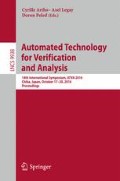Abstract
We present an analysis technique for temporal specifications of reactive systems that identifies, on the level of individual system outputs over time, which parts of the implementation are determined by the specification, and which parts are still open. This information is represented in the form of a labeled transition system, which we call skeleton. Each state of the skeleton is labeled with a three-valued assignment to the output variables: each output can be true, false, or open, where true or false means that the value must be true or false, respectively, and open means that either value is still possible. We present algorithms for the verification of skeletons and for the learning-based synthesis of skeletons from specifications in linear-time temporal logic (LTL). The algorithm returns a skeleton that satisfies the given LTL specification in time polynomial in the size of the minimal skeleton. Our new analysis technique can be used to recognize and repair specifications that underspecify critical situations. The technique thus complements existing methods for the recognition and repair of overspecifications via the identification of unrealizable cores.
This work was partially funded by the European Research Council (ERC) Grant OSARES (No. 683300) and by the Deutsche Telekom Foundation.
Access this chapter
Tax calculation will be finalised at checkout
Purchases are for personal use only
References
Alur, R., Moarref, S., Topcu, U.: Counter-strategy guided refinement of GR(1) temporal logic specifications. In: Formal Methods in Computer-Aided Design, FMCAD 2013, pp. 26–33. IEEE (2013)
Angluin, D.: Learning regular sets from queries and counterexamples. Inf. Comput. 75(2), 87–106 (1987)
Baier, C., Katoen, J.-P.: Principles of Model Checking (Representation and Mind Series). MIT Press, Cambridge (2008)
Bloem, R., Jobstmann, B., Piterman, N., Pnueli, A., Saar, Y.: Synthesis of reactive(1) designs. J. Comput. Syst. Sci. 78(3), 911–938 (2012)
Bruns, G., Godefroid, P.: Model checking with multi-valued logics. In: Díaz, J., Karhumäki, J., Lepistö, A., Sannella, D. (eds.) ICALP 2004. LNCS, vol. 3142, pp. 281–293. Springer, Heidelberg (2004). doi:10.1007/978-3-540-27836-8_26
Chechik, M., Devereux, B., Easterbrook, S., Gurfinkel, A.: Multi-valued symbolic model-checking. ACM Trans. Softw. Eng. Methodol. 12(4), 371–408 (2003)
Church, A.: Logic, arithmetic, and automata. In: Proceedings of International Congress Mathematicians (Stockholm, 1962), pp. 23–35. Inst. Mittag-Leffler, Djursholm (1963)
Clarke, E.M., Allen Emerson, E.: Design and synthesis of synchronization skeletons using branching-time temporal logic. In: Kozen, D. (ed.) Logic of Programs. LNCS, pp. 52–71. Springer, Heidelberg (1982)
Easterbrook, S., Chechik, M.: A framework for multi-valued reasoning over inconsistent viewpoints. In: Proceedings of the 23rd International Conference on Software Engineering, ICSE 2001, pp. 411–420. IEEE Computer Society (2001)
Finkbeiner, B., Schewe, S.: Bounded synthesis. Int. J. Softw. Tools Technol. Transf. 15(5–6), 519–539 (2013)
Könighofer, R., Hofferek, G., Bloem, R.: Debugging unrealizable specifications with model-based diagnosis. In: Barner, S., Harris, I., Kroening, D., Raz, O. (eds.) HVC 2010. LNCS, vol. 6504, pp. 29–45. Springer, Heidelberg (2011). doi:10.1007/978-3-642-19583-9_8
Li, W., Dworkin, L., Seshia, S.A.: Mining assumptions for synthesis. In: Singh, S., Jobstmann, B., Kishinevsky, M., Brandt, J. (eds.) 9th IEEE/ACM International Conference on Formal Methods and Models for Codesign, MEMOCODE 2011, Cambridge, UK, 11–13 July 2011, pp. 43–50. IEEE (2011)
Manna, Z., Wolper, P.: Synthesis of communicating processes from temporal logic specifications. ACM Trans. Program. Lang. Syst. 6(1), 68–93 (1984)
Pnueli, A., Rosner, R.: On the synthesis of a reactive module. In: Proceedings of the 16th ACM SIGPLAN-SIGACT Symposium on Principles of Programming Languages, POPL 1989, pp. 179–190. ACM, New York (1989)
Pnueli, A.: The temporal logic of programs. In: Proceedings of the 18th Annual Symposium on Foundations of Computer Science, SFCS 1977, pp. 46–57. IEEE Computer Society (1977)
Rosner, R.: Modular synthesis of reactive systems. Ph.D. thesis, Weizmann Institute of Sceince, Rehovot, Israel (1992)
Vardi, M.Y.: Alternating automata and program verification. In: Leeuwen, J. (ed.) Computer Science Today. LNCS, vol. 1000, pp. 471–485. Springer, Heidelberg (1995). doi:10.1007/BFb0015261
Author information
Authors and Affiliations
Corresponding author
Editor information
Editors and Affiliations
Rights and permissions
Copyright information
© 2016 Springer International Publishing AG
About this paper
Cite this paper
Finkbeiner, B., Torfah, H. (2016). Synthesizing Skeletons for Reactive Systems. In: Artho, C., Legay, A., Peled, D. (eds) Automated Technology for Verification and Analysis. ATVA 2016. Lecture Notes in Computer Science(), vol 9938. Springer, Cham. https://doi.org/10.1007/978-3-319-46520-3_18
Download citation
DOI: https://doi.org/10.1007/978-3-319-46520-3_18
Published:
Publisher Name: Springer, Cham
Print ISBN: 978-3-319-46519-7
Online ISBN: 978-3-319-46520-3
eBook Packages: Computer ScienceComputer Science (R0)

